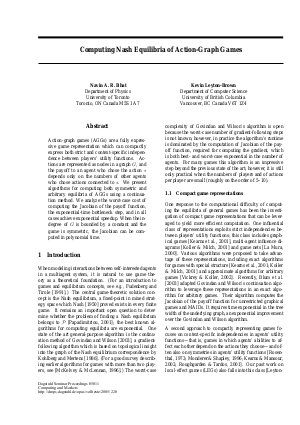Computing Nash Equilibria of Action-Graph Games
Authors Kevin Leyton-Brown, Navin A.R. Bhat
-
Part of:
Volume:
Dagstuhl Seminar Proceedings, Volume 5011
Part of: Series: Dagstuhl Seminar Proceedings (DagSemProc) - License:
 Creative Commons Attribution 4.0 International license
Creative Commons Attribution 4.0 International license
- Publication Date: 2005-07-26
File

PDF
DagSemProc.05011.6.pdf
- Filesize: 411 kB
- 8 pages
Document Identifiers
Subject Classification
Keywords
- compact representation of games
- action-graph games
- Nash equilibria
Metrics
- Access Statistics
-
Total Accesses (updated on a weekly basis)
0Document
0Metadata
Abstract
This talk will survey two graphical models which the authors have proposed for compactly representing single-shot, finite-action games in which a large number of agents contend for scarce resources. The first model considered is Local-Effect Games (LEGs). These games often (but not always) have pure-strategy Nash equilibria. Finding a potential function is a good technique for finding such equilibria. We give a complete characterization of which LEGs have potential functions and provide the functions in each case; we also show a general case where pure-strategy equilibria exist in the absence of potential functions. Action-graph games (AGGs) are a fully expressive game representation which can compactly express both strict and context-specific independence between players' utility functions, and which generalize LEGs. We present algorithms for computing both symmetric and arbitrary equilibria of AGGs, based on a continuation method proposed by Govindan and Wilson. We analyze the worst- case cost of computing the Jacobian of the payoff function, the exponential- time bottleneck step of this algorithm, and in all cases achieve exponential speedup. When the indegree of G is bounded by a constant and the game is symmetric, the Jacobian can be computed in polynomial time.
Cite As Get BibTex
Kevin Leyton-Brown and Navin A.R. Bhat. Computing Nash Equilibria of Action-Graph Games. In Computing and Markets. Dagstuhl Seminar Proceedings, Volume 5011, pp. 1-8, Schloss Dagstuhl – Leibniz-Zentrum für Informatik (2005)
https://doi.org/10.4230/DagSemProc.05011.6
BibTex
@InProceedings{leytonbrown_et_al:DagSemProc.05011.6,
author = {Leyton-Brown, Kevin and Bhat, Navin A.R.},
title = {{Computing Nash Equilibria of Action-Graph Games}},
booktitle = {Computing and Markets},
pages = {1--8},
series = {Dagstuhl Seminar Proceedings (DagSemProc)},
ISSN = {1862-4405},
year = {2005},
volume = {5011},
editor = {Daniel Lehmann and Rudolf M\"{u}ller and Tuomas Sandholm},
publisher = {Schloss Dagstuhl -- Leibniz-Zentrum f{\"u}r Informatik},
address = {Dagstuhl, Germany},
URL = {https://drops.dagstuhl.de/entities/document/10.4230/DagSemProc.05011.6},
URN = {urn:nbn:de:0030-drops-2209},
doi = {10.4230/DagSemProc.05011.6},
annote = {Keywords: compact representation of games, action-graph games, Nash equilibria}
}
